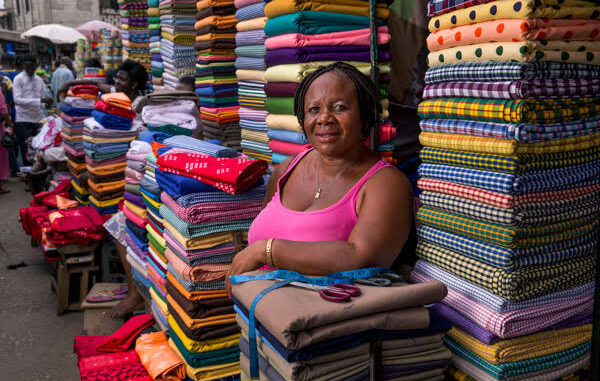
‘Please don’t post it on social media o,’ that has been Violet’s parting words with each customer these past weeks. Violet is one of the few employees in a specialized hair salon downtown Lagos, popular among a teeming number of women who wear their hair in locks. Working in a non- essential business category meant her employer had to comply with the government directive to shut down on March 25th. While her March salary was not threatened, her April salary was not assured.
She soon prevailed on her employer to service few clients on appointments only- a maximum of three people in the salon, at strictly regulated hours, thereby earning some income for her employer and securing some of her N40,000 monthly pay. The clients are under strict embargo not to post their experiences on social media to avert potential government crackdown. Violet is one of the millions of women working in Nigeria’s informal sector, fighting hard to keep food on the table as COVID-19 continues to ravage nations.
Hunger and malnutrition are problems that have plagued much of Nigeria’s population for years But with COVID-19 , various restrictions to movement in addition to social distancing measures being taken to curb the outbreak, many people who were previously not in the “at-risk” group have found themselves without their daily wage and the food that it would have afforded them.
Much of Nigeria’s informal economy (who contributed over 60% to GDP in 2019) have found themselves in this bucket- unsure about where their next meal will come from. Many simply do not have the luxury to worry about an invisible virus – when hunger may kill them much faster than any virus ever could. Violet is not unique, there are millions like her who if they don’t ignore government mandates would be unable to make any money or feed herself and her family.
Jobs in the informal sector are not well documented or accounted for. A good number are not regulated or structured and operations are left at the discretion of the employer; hence informality can mean a lack of social protection, rights at work, or in several cases, the absence of decent working conditions. For the owners of these businesses it could even be worse: low productivity and poor access to capital is common. Women employees and small business owners within this economy have it even tougher.
Of the two billion people in the world who make their living in the informal economy, 93 per cent live in emerging and developing economies. The prevalence in Africa is staggering with 85.8% working in informal employments.
According to the International Labour Organisation, as high as 83% of informal economy workers in Africa are significantly impacted by the lockdown measures – the bulk of this, women. Women are seven percent less likely than men to be involved in the formal economy due to a disadvantaged socio cultural perception that predisposes women to getting the shorter end of the stick in education, skill acquisition, marriage, childbirth and parenting, politics, jobs, welfarism and life in general. The experience is the same with financial inclusion. The lack of appropriate financial services tailor-made for their realities poses a limitation to their self-actualization, having a decent quality of life, potential contribution to the society and the global economy.
Most people enter the informal economy as a consequence of the lack of opportunities in the formal sector and in the absence of other means of livelihood. This is true for a lot of the women we work with at Mamamoni. Providing skill acquisition programmes and access to small loans to set up micro-entreprises are some of the ways we help to improve this underserved women’s outcome, but it is proving inadequate.
Take for instance, Awele; a local primary school teacher and mother of four who supported her family with her N25,000 salary. Needing more income, she devoted time to attend our empowerment programme where she learnt fashion designing. With some partners’ help, we assisted Awele in buying a sewing machine.
Before COVID hit, she had planned to invest her March salary in buying the rest of the small items – fabrics, threads, zips, needles, buttons etc – required for starting her business. Unfortunately, she never got paid.
The little savings she had quickly depleted in the first week of the lockdown and she had to visit Mamamoni for relief items. The schools have stayed shut, so have her dreams and she is now fast slipping below the poverty line.
Like Awele, many women who had earned an income are now in danger of being redomesticated, their businesses wiped out and whatever autonomy and respect they had earned by contributing to the home, dissipating. The impact of this reversal will have far reaching consequences – on the progress we have made in equality, gender-based violence and even the prioritisation of children’s education in the home. This reversal will also have a considerable impact on our economy.
How do we ensure that industrious women like Awele and Violet do not fall below the poverty line, their ability to earn an income stifled- and their vulnerable businesses decimated by COVID mitigation strategies?
What should the government, and civil society be doing to ensure that we do not discount the informal economy- the engine on which our country has run for so many years?
What policies, moratoriums, disbursements and education will safeguard their economic outcomes and protect the wellbeing of the millions of people who work in this segment of our economy?
The first step is inclusion- including the women who make up the larger part of the informal economy in the considerations, strategies and programs being designed as we map out a way forward for Nigeria in a COVID-19 and Post Covid-19 reality.
END

Be the first to comment